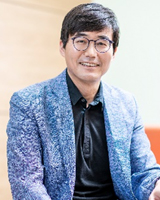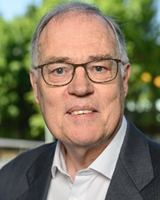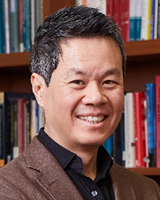
ModeratorM. Jae Moon
- Organization, Position : Underwood Distinguished Professor, Yonsei University, Department of Public Policy and Management
- Curriculum Vitae
- 1997~Present: Underwood Distinguished Professor and Director, Yonsei University
- 2022~Present: Member, Presidential Committee on Digital Platform Government
- 2022~Present: Member, Advisory Group for Digital Technology for Development, Asian Development Bank
- 2022~Present: Chair, Digital Government Document Innovation Forum.
- M. Jae Moon is Underwood Distinguished Professor of Public Policy and Management and Director of the Institute for Future Government at Yonsei University. He is currently a member of the Presidential Committee on Digital Platform Government and also chairs the Digital Government Document Innovation Forum as well as the National Strategies Research Committee of the National Research Council for Economics, Humanities, Social Sciences. He is an elected Fellow of National Academy of Public Administration (NAPA). He was selected as one of world’s 100 most influential people in Digital Government 2018 and 2019 consecutively by Apolitical which is a London-based leading nonprofit organization. His work on digital government was also selected as one of the most influential 75 pieces published in Public Administration Review. He received Order of Service Merit-Red Stripe from the Government of the Republic of Korea for his contribution to the public sector innovations and the Donald C. Stone Award (2020) from American Society for Public Administration.

Citizen-centric smart cities : a global view
Which cities do it better and what the future holdsBruno Lanvin
- Organization, Position : President, IMD Smart City Observatory
- Curriculum Vitae
- 2019~Present: President Smart City Observatory (IMD, Lausanne)
- 2018~Present: Co-founder and Advisor, Portulns Institute, Washington DC
- 2012~Present: Founder and President, D&L Partners Consultancy, Genev2
- Then President and CEO, Descartes Institute for the Future, Geneva
- Dr. Bruno Lanvin is currently the President of IMD’s Smart City Observatory, and a Distinguished Fellow at INSEAD.
He is the co-founder and co-author of four of the most widely used global indices on technology (Network Readiness Index), innovation (Global Innovation Index), talent (Global Talent Competitiveness Index) and Smart Cities (Smart City Index). He is the co-founder and director of Portulans Institute, a thinktank based in Washington DC. During 30 years, he worked at the United Nations and at the World Bank, where he held senior positions. He currently advises governments, international organizations and multinational companies on strategic issues. His latest book (The Future Is Young) was published in July 2022.
Bruno Lanvin studied in France and in the USA. He holds a BA in Mathematics and Physics, an MBA (HEC), a PhD in Economics (La Sorbonne), and certificates from INSEAD (IDP-C) and MIT (Smart Cities).
A French national, and the proud father of four, he currently lives in Switzerland.
The presentation will briefly introduce the IMD Smart Cities Index, stressing some of the key results registered in 2022-23. It will then identify some of the ‘hot issues’ that are currently shaping local and international debates about smart cities, and conclude on describing possible paths available to smart cities in the future.

Methodological Issues and Solutions in the Seoul Smart City Award Selection ProcessSukwon Lee
- Organization, Position : Professor, Seoul National University Graduate School of Public Administration
- Curriculum Vitae
- 2002 ~ Present: Professor. Seoul National University
- 2023 ~ Present: Advisory committee for Public Interest Audit Request. The Board of Audit and Inspection Korea.
- 2014 ~ Present: Executive Director. Center for International Development Evaluation, Seoul National University
- Dr. Lee has been a professor at the Seoul National University Graduate School of Public Administration since 2002 and is currently the director of the Center for International Development Evaluation at Seoul National University.
His research interests include policy evaluation, policy experimentation, and performance management. He has advised various government ministries, including the National Commission on Population and Ageing, the National Audit Office, the Supreme Prosecutors' Office, the Ministry of Health and Welfare, and the Prime Minister's Office.
Awards and contests including the Seoul Smart City Awards inevitably recognize winners with entries that receive the highest scores after subjective evaluation of the jury panel. However, impartial winner selection which serves the purpose of a contest requires minimizing subjective assessment and a number of methodologies when aggregating and processing scores. This presentation will examine some methodological issues that arise in this process and cover how the Seoul Smart City Awards addressed these challenges. In particular, the presentation will focus on how the influence of ‘environmental factors of innovation’ – an element which has a significant impact on innovation performance but is hardly changed by the applicants’ efforts only – was controlled.